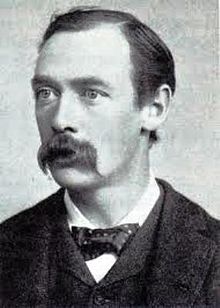Difference between revisions of "George Manwaring"
(Created page with "300px|thumb|right '''George Manwaring''' was a hymnwriter and a few of his works have remained favorites among members of [http://Mormon.org Th...") |
|||
| Line 9: | Line 9: | ||
Manwaring worked as manager of the retail grocery department of ZCMI then as traveling salesman for the D. O. Calder Music Palace. | Manwaring worked as manager of the retail grocery department of ZCMI then as traveling salesman for the D. O. Calder Music Palace. | ||
| − | Manwaring died of pneumonia on July 7, 1889, less than a month after his release from prison. He had been among the hundreds of members of the Church who were incarcerated under the 1882 Edmunds Act for living the law of [[plural marriage]]. He died at the age of thirty-five and left two widows and seven children. | + | Manwaring died of pneumonia on July 7, 1889, less than a month after his release from prison. He had been among the hundreds of members of the Church who were incarcerated under the 1882 Edmunds Act for living the law of [[Plural Marriage|plural marriage]]. He died at the age of thirty-five and left two widows and seven children. |
| − | His other hymns included in the [[1985 Hymnbook]] include “Lord, We As Thee Ere We Part,” “Sing We Now at Parting,” “ ’Tis Sweet to Sing the Matchless Love,” and “We Meet Again in Sabbath School.” | + | His other hymns included in the [[Hymns of The Church of Jesus Christ of Latter-day Saints (1985 book)|1985 Hymnbook]] include “Lord, We As Thee Ere We Part,” “Sing We Now at Parting,” “ ’Tis Sweet to Sing the Matchless Love,” and “We Meet Again in Sabbath School.” |
==External Source== | ==External Source== | ||
Revision as of 15:30, 29 November 2019
George Manwaring was a hymnwriter and a few of his works have remained favorites among members of The Church of Jesus Christ of Latter-day Saints, including “Joseph Smith’s First Prayer.” He wrote both words and music to this hymn, although the arranger, A. C. Smyth is listed as the composer.
Manwaring was born on March 19, 1854, in Cheshire, England. His family was converted, baptized, and immigrated to Utah Territory in 1871. They settled in Springville, Utah. George had been baptized at the age of nine.
Manwaring’s formal schooling was limited to only a few weeks and he had no formal music training. During his youth, he was an errand boy in a country store and borrowed more books from his employer and other. He studied stenography, mathematics, and literature. In Utah, he often used his skills to report sermons given in the Tabernacle. He sang bass in the Tabernacle Choir at Temple Square. He played the piano and organ and wrote numerous poems and hymns. He taught music lessons and traveled throughout Utah teaching children music in Sunday School. Many of his poems and songs were printed in the Sunday School Union Song Book.
Manwaring worked as manager of the retail grocery department of ZCMI then as traveling salesman for the D. O. Calder Music Palace.
Manwaring died of pneumonia on July 7, 1889, less than a month after his release from prison. He had been among the hundreds of members of the Church who were incarcerated under the 1882 Edmunds Act for living the law of plural marriage. He died at the age of thirty-five and left two widows and seven children.
His other hymns included in the 1985 Hymnbook include “Lord, We As Thee Ere We Part,” “Sing We Now at Parting,” “ ’Tis Sweet to Sing the Matchless Love,” and “We Meet Again in Sabbath School.”
